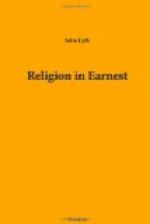narrowed down to a single channel. The causes
of such alternations might be profitably investigated,
and recorded. The inquiry into one’s ancestry
would thus answer a nobler purpose than the gratification
of human vanity, or the recovery of an alienated inheritance;
it would exhibit the influence of the past upon the
present, afford important lessons of encouragement
or admonition, and discover our claim perhaps, to
something better than gold or silver “for the
good man” even though he is poor, “leaveth
an inheritance to his children’s children.”
How far the moral character as well as the physical
constitution of a parent may affect the happiness and
control the destiny of his children, is a question,
which may be incapable of an exact and satisfactory
solution; but the general fact, notwithstanding some
strange exceptions, (which however may not be altogether
incapable of explanation,) is sufficiently established,
that examples of singular excellence, or notorious
profligacy may usually he traced to seeds sown in
a former generation. They are not therefore to
be altogether regarded in the light of isolated phenomena,
but as the result of causes, which may be more or
less accurately determined. At all events, God
reveals himself as “a jealous God, visiting the
iniquity of the fathers upon the children unto the
third and fourth generation of them that hate him,
and
shewing mercy unto thousands
of them that love him and
keep his commandments.”
II.
Early dawn.
“Thou hast hid these
things from the wise and prudent
and hast revealed them
unto babes.” Matt. xi. 25.
What solemn interest surrounds the dawn of immortal
existence,—that precious portion of human
life, the first four or five years, which may be termed
the perceptive period, too often treated as a mere
blank, in which nothing is to be attempted; when the
soul is all eye, all ear, continually storing up in
an almost faultless memory, impressions, which go
far to mould the future character, and which reason,
so soon as it is able, will certainly use as part of
the material out of which it must form its conclusions!
How much of the future depends upon the kind of influence
to which the infant mind is subjected! Happily
for Mary Burdsall these early years were carefully
watched and guarded. The bold and uncompromising
character of her father, and the gentle piety of her
mother, secured to her a combination of influences
particularly favourable to the development of moral
and religious feeling. Lessons of truth and love,
as yet beyond the comprehension of the child, were
effectively taught by means of bright and living examples;
and hence grace began to operate with the first unfoldings
of reason.




